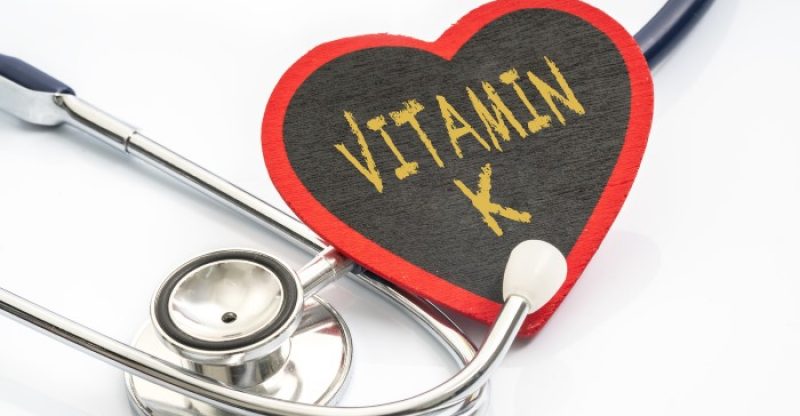12 Evidence-Based Health Benefits of Vitamin K
Vitamin K is important in coagulation, also known as blood clotting.
This prevents excessive bleeding.
You cannot take vitamin K as a dietary supplement as you would other vitamins.
This vitamin is a group of compounds that come together to synthesize the proteins that lead to blood clotting (1).
The most vital of these compounds are vitamins K1 and K2.
Vitamin K1 can be obtained from green leafy vegetables and a few other vegetables.
Vitamin K2 is another group of compounds on its own and comes from meat, cheese, synthesized bacteria, and eggs.
In the US, vitamin K1 is available as a supplement.
Recently, vitamin K2 has been used in the treatment of osteoporosis and bone loss.
However, there is no research supporting the effectiveness of this vitamin on the said conditions.
The relationship between this vitamin and bone development is still under study; some scientists believe that it has an impact on bone health.
Individuals can get enough of this vitamin from food, and this limits chances of its deficiency in adults.
Again, the body synthesizes K2.
In adults, the body is good at recycling the existing supply of vitamins K.
But there are certain conditions that require the use of drugs that interfere with the absorption and synthesis of K vitamins, and these this will lead to deficiency.
K1 and K2 deficiency is common in infants.
It leads to an illness referred to as VKDB, which is characterized by bleeding.
The K vitamins K1 and K2 can be obtained from food, or they can be injected into the body as supplements.
Signs of Vitamin K Deficiency
Excessive bleeding is the main symptom of vitamin K deficiency.
You should note that bleeding might occur even in areas with no cut or wound.
You can experience bleeding when you have a simple bruise, get small clots of blood beneath your nails, start bleeding in the mucous membranes lining the inner parts of your body, or you can even produce stool with a dark black tar-like consistency due to blood.
In infants, where deficiency symptoms are common, doctors will observe deficiency when there is:
- Bleeding where the umbilical cord was cut.
- Bleeding on their skin, in their gastrointestinal tract, and in the nose.
- Bleeding in any other area of the body.
- Excess bleeding at the penis if the baby is circumcised at birth.
- Sudden bleeding in the brain, which can be life-threatening.
Some adults are at risk of being deficient in this vitamin if they:
- Take anticoagulants, which thin the blood.
- Take antibiotics.
- Suffer from a condition that inhibits the proper absorption of fats.
- Take diets that lack the K vitamins K1 and K2 completely.
Coumarin anti-coagulants, when used, interfere with the production of proteins that are involved in blood clotting.
Some antibiotics interfere with the body’s ability to synthesize K vitamins with others and reduce the effectiveness of K1 and K2 vitamins in the body.
People with celiac disease, with disorders affecting the intestines and the biliary tract, with cystic fibrosis, and those in whom part of the intestine has been removed will suffer fat malabsorption.
This will interfere with the body’s ability to synthesize vitamins and hence lead to vitamin K deficiency.
The risk of deficiency is high in newborn infants due to:
- Low quantities of K vitamins in breast milk.
- The vitamin is not efficiently transferred from the mother to the baby through the placenta.
- Newborn’s liver does not use vitamins efficiently.
- For the first few days after birth, there is no synthesis of vitamins in the body.
Diagnosing vitamin K deficiency will require that the doctor understand your medical history.
If you are at risk of being deficient, the doctor will perform a coagulation test, known as the prothrombin test, to ascertain that the symptoms experienced are indeed caused by lack of K vitamins.
The prothrombin test is a simple blood test that measures the duration your blood takes to clot.
Normal blood takes between 11 and 13.5 seconds to clot once some chemicals are added to it in the lab.
Blood that takes longer than 13.5 seconds means a person is deficient in K vitamins.
Internationally, laboratories use a ratio.
A ratio of between 0.9 and 1.1 is normal, and anything higher than that means the individual is using a blood thinner or they are deficient in K vitamins.
Deficiency Treatment and Prevention
Phytonadione, a drug, is used in the treatment of vitamin K deficiency.
This drug is a supplement for vitamin K1.
In most cases, it is prescribed as an oral medication, but other times it is injected under your skin.
You can prevent or reverse vitamin K deficiency and the conditions associated with it by getting the right amount of vitamin K every day from food.
There is no predefined amount that a person should take each day, but the recommendation is at least 120mg and 90mg for men and women respectively.
Green leafy vegetables have enough vitamin K for individuals.
For infants, a single shot of vitamin K1 supplement at birth will reduce deficiency symptoms.
People with fat malabsorption and those who are taking anticoagulants should have a doctor monitor their vitamin K levels, and administer supplements as necessary.
If the deficiency is left untreated, the individual will suffer excessive bleeding, which might be dangerous.
However, it is treatable. In infants, VKDB is easy to identify and manage.
If the condition is left for too long without treatment, a condition known as intracranial hemorrhage might result in brain damage and, in severe instances, death.
Benefits of Vitamin K
Improves Bone Health and Treats Osteoporosis
Bones need calcium, among other nutrients, to stay healthy.
For the bones to use calcium, a substance known as osteocalcin is needed.
Osteocalcin binds calcium that is released by osteoblasts, or bone cells (2).
This makes it available to the bone cells and, therefore, enhances its effectiveness in maintaining bone health.
Osteocalcin is activated by K2.
The availability of K2 in the diet or in the body, therefore, leads to the availability of osteocalcin, which then binds calcium (3).
K2 has been shown to enhance bone mineral density.
A study conducted on women past menopause showed that individuals with high K2 levels were less prone to bone fractures.
This group had improved bone strength (4). Lack of vitamin K leads to a lack of osteocalcin.
This means that released calcium will not be bound to the bones, and ends up sticking in the arteries.
This, in turn, causes the arteries to harden, resulting in arteriosclerosis.
According to scientific studies, patients with osteoporosis showed reduced bone fractures when K2 supplements were administered.
Chances of bone fracture reduced up to 80 percent (5).
Prolonged vitamin K deficiency will result in osteoporosis, and in severe cases, lead to arterial defects.
Low levels of vitamin K will result in increased inflammation, and bone pain linked to weakness and fractures.
With supplements, these conditions are reversible.
Prevents Heart Disease
The use of K2 supplements has been linked to a reduced rate of heart disease.
If you take about 10mg of K2 each day, your chances of developing heart disease reduce by up to 9 percent (6).
By taking K2 supplements, osteocalcin, the substance that binds released calcium to bones, is activated.
When calcium is bound to bones, it is prevented from being deposited in arteries, which reduces arterial defects and, hence, heart disease.
In a study conducted on mice, drugs that have been shown to block vitamin K have been observed to accelerate the hardening of arteries (7).
Individuals taking K2 at high levels have a 52 percent lower chance of developing arterial defects, as no calcium is deposited in their arteries.
This reduces their chances of dying from heart disease by up to 57 percent (8).
Another study, conducted over a period of three years, showed that supplementing with K1 reduced the rate of arterial calcification in your heart.
This, again, reduces the chances of your developing heart disease (9).
This result also showed that effects of calcification in the arteries are reversible if a patient takes supplements.
While heart disease will take a long time to treat with supplementation, minor symptoms can be reversed.
Enhances Teeth Strength
Teeth are made in the same way that bones are.
This means that teeth weakness can be linked to vitamin K deficiency.
In the same way, vitamin K activates osteocalcin, which binds calcium to the teeth and, thereby, enhances their development and strength.
Osteocalcin, when activated, stimulates the growth of new dentine to enhance your teeth’s strength (10).
When you are flossing and you experience pain in your gums, supplementing with K2 can alleviate the pain.
This is true when the pain is caused by teeth weakness.
Lack of vitamin K will lead to the deposition of calcium where it is not needed, especially in the blood vessels.
This, in turn, will lead to weak teeth, pain in the gums, and sometimes, gum bleeding.
The condition is reversible by taking a K2 supplement.
Reduces Inflammation
Supplementing with vitamin K has been associated with reduced inflammation.
In a study, the vitamin was shown to influence the biomarkers that control inflammation.
Though the conditions in which vitamin K influences biomarkers are not apparent, the study assumes that vitamin K decreases the expression of genes linked to individual cytokines (11).
With low levels of vitamin K, the level of cytokines increases, and this results in bone loss and increased inflammation.
Unfortunately, supplementing with K2 does not lower the levels of cytokines (12).
So the best way is to take K2 supplements before the concentration of cytokines increases.
The ability of vitamin K to reduce inflammation is linked to its ability to enhance bone strength and reduce the rate of cardiovascular diseases.
By reducing calcification in the arteries and other parts of the body, vitamin K is able to reduce inflammation.
Fights Autoimmune Conditions
Supplementing with vitamin K has been shown to fight autoimmune conditions that have the same effects as multiple sclerosis (13).
People with rheumatoid arthritis can reduce their chances of other diseases by administering daily doses of K2.
K2 supplements can also be used to reverse the effects of the autoimmune response and, therefore, prevent a number of diseases (14).
Boosts Respiration
Studies have shown that K2 is involved in the transportation of electrons in mitochondria.
This also happens with K1, which boosts mitochondrial activity and functions by creating the required energy.
In turn, this facilitates respiration and energy production (15).
This means that if you supplement with K2 or K1 when you are feeling weak, the vitamin will enhance cellular respiration to give you much-needed energy.
The activities of K2 are similar to those of ubiquinone, a substance used in the transport of electrons in mitochondria.
In mice, however, administering K2 did not replace all ubiquinone functions (16).
In another study, K2 was able greatly to enhance mitochondrial performance, reducing the time taken to produce energy in the body (17).
With an electron, K2 has antioxidant properties (18).
It prevents the death of glutathione-depleted neurons. This keeps the body’s sense cells intact.
Fights Cancer
High K2 intake has been linked to a reduced risk of developing prostate cancer.
By taking sufficient K2 supplements each day, the risk of prostate cancer goes down by up to 63 percent (19).
Another study found that taking K2 supplements reduced the development of lung cancer by destroying the cancer cells that appear in the lungs (20).
Note that these benefits have only been associated with K2, and not K1.
Patients with acute leukemia have been treated with K2, among other drugs and supplements.
The vitamin has also been used in the treatment of myelodysplastic syndrome (21).
Patients with liver cancer can prevent the recurrence of cancerous cells and enhance their survival rate by taking K2 supplements, according to studies (22, 23).
Other studies have found no link between K2 supplementation and liver cancer recurrence for the first few months.
These studies instead discovered long-term benefits of K2 supplementation in reducing liver cancer recurrence.
After three years of administering K2 daily, the risk of liver cancer is significantly reduced (24).
Besides preventing recurrence, K2 supplementation works well with chemotherapy and other cancer treatments.
The vitamin ensures that cancerous cells and tumors do not occur.
According to a study conducted on a Mediterranean population, vitamin K intake significantly reduces the risk of developing any type of cancer (25).
This was especially noted in patients with cardiovascular disease.
Vitamin K reduces the chance of cancer by activating growth arrest-specific gene 6, also referred to as Gas6.
Gas6 is the gene that destroys cancer cells in your body, and without vitamin K, Gas6 cannot function (26).
Vitamin K and Brain Development
K2 is the basic form in which the brain utilizes K vitamins. K2, specifically MK-4, represents about 98 percent of all the vitamin K in the brain.
Irrespective of your age, the level of K2 will always be that high.
According to studies, the onset of Alzheimer’s disease in younger people is due to decreased intake of vitamin K.
Study subjects were compared to subjects with great control of their cognitive processes (27).
Studies have also shown that K2 is positively correlated with sphingomyelin and sulfatides.
While the functions of these two substances are not clear, K2 studies have shown increased brain function from K2 supplementation (28).
Reduces Menstrual Pain and Bleeding
With the right amount of K1 and K2, women can reduce PMS cramps and pains associated with menstruation.
The vitamins do this by regulating the hormone functions in your body.
As vitamin K is actively involved in blood clotting, it reduces the bleeding that comes with menstruation.
Excessive bleeding causes more cramps and, therefore, more pain during menstruation.
According to studies, supplementing with vitamin K2 reduces the symptoms of PMS, while the deficiency in vitamin K will make PMS symptoms even worse.
Blood Clotting
If you get enough vitamin K every day from foods or supplementation, your blood will clot normally.
The process of blood clotting is complex, and it requires at least 12 proteins before it is completed.
Four of the essential proteins needed for blood clotting are activated by vitamin K, and so you need this vitamin at all times.
Besides enhancing blood clotting, vitamin K ensures you do not bruise easily, and your bruises and cuts will heal fast.
Hemorrhagic Disease of Newborns, commonly known as HDN, is a condition in infants where blood clotting does not take place as it should.
This condition is common in infants suffering from vitamin K deficiency.
This condition is easy to treat with a single injection of K2. HDN can be prevented by injecting infants with K2 immediately after birth (29).
Lowers Insulin Resistance
Insulin is administered to those suffering from diabetes.
By supplementing with vitamin K for about four weeks, the level of insulin sensitivity was increased in healthy young men.
This occurred through the carboxylation of osteocalcin (30).
A different study found that insulin resistance declined in older men, even with administration of K2.
However, this effect was not observed in women (31).
Prevents Negative Effects of Vegetable Oils and Statins
Statins, warfarin, and vegetable oils act as anticoagulants.
They inhibit the activities that are in part controlled by vitamin K.
This increases the risk of developing cardiovascular disease, diabetes, and kidney disease.
It also leads to bone fractures, and in severe cases, mental disorders (32).
By taking K2 supplements, an individual is able to reverse the side effects associated with these oils and drugs.
Vitamin K-Rich Foods
As an adult, you should take at least 90 mcg of vitamin K daily.
While the recommended daily allowance for this vitamin is dependent on age and gender, most people will get enough from their food.
Some of the best foods containing this vitamin include:
- Spring onions – 207 mcg per cup
- Brussel sprouts – 156 mcg per cup
- Dandelion greens –428 mcg for every cup of raw greens
- Mustard greens – A single cup provides about 278 mcg of vitamin K
- Swiss chard – 298 mcg per cup
- Turnip greens – 138 mcg per cup
- Spinach – up to 145 mcg per cup
- Raw kale – up to 112 mcg per cup
- A cup of broccoli – 92 mcg
- Cabbage – 52 mcg in every cup
- Asparagus – 55 mcg for every cooked cup
- Sea vegetables – 52 mcg for every cup
- Cucumber – only 17 mcg for every cup
- Cauliflower – 16 mcg for every cup
Other sources of vitamin K include meats such as beef, pork liver, and chicken.
You can also obtain vitamin K from animal products such as eggs, whole milk, and cheese, among others.
While the amount of vitamin K is low in meat and animal products, there is enough for your daily dose of vitamin K.
Whole food sources have the highest amount of vitamin K.
This means you should eat plenty of leafy green vegetables, sea vegetables, and cruciferous vegetables, among others.
You can try some dishes such as peachy super kale shake, broccoli pesto dip, lemon pepper green beans, and asparagus with red pepper sauce.
Combining different sources of vitamin K will ensure that you get enough K1 and K2 vitamins.
Side Effects
Not everyone will be affected by excessive intake of this vitamin, whether through supplementation or naturally through food.
Supplementing with K1 or K2 will offer the needed benefits, but it can cause unwanted effects in some people.
Not all side effects will occur when K1 or K2 is administered, but some side effects are severe and require medical attention.
To avoid them, it is advisable to consume the recommended daily intake.
Even for the less common and less severe side effects, you should see a doctor for guidance.
Some of the less common side effects include:
- Loss of appetite
- Decreased activity and nausea
- Breathing difficulties
- Irritability
- Paleness and general body weakness
- Enlargement of the liver
- Body swelling, especially at the back
- Muscle stiffness
- Yellow eyes, or yellow skin patches
These side effects might be experienced by some people and not others.
Some side effects are rare and only occur in people whose bodies are sensitive.
They include difficulty in swallowing, fainting and lightheadedness, irregular breathing, skin rash, shortness of breath, swelling of the eyelids, face, and lips, dizziness, blue color and flushing on the skin, and tightness in the chest.
Side effects manifest differently in different people.
Some may experience high blood pressure, while others will have breathing difficulties.
Nonetheless, when taken at the right dosage, vitamin K has no side effects in the majority of people.
Most side effects do not require a doctor’s intervention.
In fact, you might not notice the side effects you may have after supplementing with vitamin K.
They will go away as you continue with treatment, as the body will adjust to the medicine.
You can also talk to your healthcare provider about ways to reduce any side effects associated with vitamin K intake.
You might experience swelling and unusual taste at times during treatment.
If the side effects take a long time to clear, you should seek the help of a healthcare professional.
Dosage
While the recommended daily allowance will depend on age and gender, factors such as pregnancy, lactation, and illnesses will affect the amount of vitamin K you take.
Consuming more than the recommended amount might lead to side effects while taking low amounts of it might lead to deficiency.
Below are the recommended amounts.
Infants
Between birth and six months, administer about 2 micrograms per day, and between 7 and 12 months, administer about 2.5 mcg per day.
For infants, the doctor might administer K2 immediately after birth.
Children
- Between 1 and 3 years – 30 mcg per day
- Between 4 and 8 years – 55 mcg per day
- Between 9 and 13 years – 60 mcg per day
Adolescents and Adults
- Between 14 and 18 years, both male and female – 75 mcg per day
- 19 years and older, both male and female – 90 mcg per day
Expectant and lactating mothers should only take the recommended daily intake for adults.
When consumed in the right dosage, vitamin K is considered safe for the mother and the baby.
For higher doses, the mother needs to consult a healthcare professional.
For children, vitamin K1 is considered likely safe when taken orally or injected.
K2 should only be administered under the direction of a healthcare professional.
For diabetics, vitamin K1 lowers blood sugar.
For people with diabetes, administration of K1 should be supervised by a doctor, and your blood sugar level should be monitored often.
People with kidney disease and receiving dialysis should not take vitamin K supplementation, as it will interfere with their treatments.
Administering K1 does not reverse the clotting problems that result from severe liver disease.
High doses of K1 might worsen clotting issues resulting from liver damage.
For individuals with reduced bile secretion, taking K1 might require them to take supplemental bile salts to enhance absorption.
Possible Interactions
For any condition, whether pregnancy or illness, an individual should not take more than the recommended dose without first consulting with their physician.
If you have ever experienced a stroke, blood clotting in your body, or cardiac arrest, only take vitamin K under the guidance of your doctor.
If you are on blood thinning drugs, you should not take K1 or K2 supplements.
Consuming excess vitamin K will interfere with how the drugs function in your body.
Those who take antibiotics for more than 10 days will need to increase their intake of vitamin K supplements.
Antibiotics destroy the bacteria that facilitate the absorption of vitamin K, and so the body absorbs less of the vitamin.
Orlistat and Olestra are two medications used for weight loss.
When used, these medications minimize the number of fats that the body can absorb.
As vitamin K is a fat-soluble vitamin, it means that less of it is absorbed when you are on these medications.
When you are on Orlistat and Olestra, the doctor might prescribe you multivitamins, as well.
FDA now requires food substances and medications with Orlistat and Olestra to contain fat-soluble vitamins, including A, D, and E.
Like Orlistat and Olestra, medications used to reduce the absorption of cholesterol in the body also reduce the absorption of vitamin K.
You should talk to your healthcare provider to ensure that you are getting enough vitamin K while taking these medications.
Vitamin E also interferes with vitamin K’s function in the body.
You should, therefore, not take vitamin E while you are taking K.
Although the benefits of K are immense, the vitamin has to be used together with other nutrients to maximize its utility.
In bone health, K has to be taken together with calcium, magnesium, and vitamin D.
When used in the right proportions, these nutrients enhance bone strength.
For those who are taking more vitamin K than the recommended amount, vitamins A and E will not be absorbed correctly, and this might lead to the deficiency in some of the vitamins.
Vitamin K and Infants
Vitamin K is given as a shot at birth.
This ensures that a deficiency is prevented in newborns and that normal body functions may occur, including healthy bone and teeth formation and normal blood clotting.
According to the American Academy of Pediatrics, newborns should be given a single shot of K1 at birth.
The shot should contain between 0.5 and 1 mcg.
Under certain conditions, administration of K1 at birth is very important.
Some of the risk factors that are involved in the deficiency of this vitamin include:
- Premature birth due to excess bleeding.
- Babies that develop in mothers who are taking anti-seizure drugs, anticoagulants, and drugs for TB.
- Babies with fat malabsorption as a result of gastrointestinal or liver disease.
- Newborns who are not given a shot of this vitamin will breastfeed excessively and might be exposed to antibiotics.
The parent will decide whether their baby will receive the injection, but it is recommended for all newborns to get it at birth.
Conclusion
Most adults do not take vitamin K supplements because deficiency symptoms are rare.
You will typically get enough of this vitamin from the food you eat every day, and so you might not see the need to supplement.
You might be wondering, what does vitamin K do?
This vitamin has been shown to affect different bodily processes, and some researchers suggest that it can reduce mortality rates by up to 50 percent over a period of ten years (33).
This is normally attributed to its ability to reduce the risk of cardiovascular diseases.
Vitamin K has a multitude of interactions with other nutrients – limiting the absorption of some, for instance, other vitamins, and activating others.
For some nutrients, using them together with vitamin K enhances their functions.
These include magnesium and calcium. This vitamin may also have side effects in some people and some situations.
Some of the side effects may be fatal, and require the intervention of a doctor; others are minor and clear up with time.
If your side effects persist, see a doctor.
FDA Compliance
The information on this website has not been evaluated by the Food & Drug Administration or any other medical body. We do not aim to diagnose, treat, cure or prevent any illness or disease. Information is shared for educational purposes only. You must consult your doctor before acting on any content on this website, especially if you are pregnant, nursing, taking medication, or have a medical condition.
HOW WOULD YOU RATE THIS ARTICLE?






